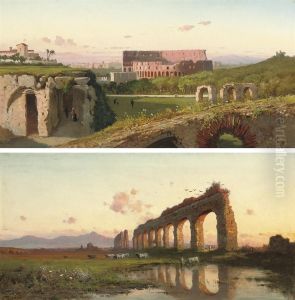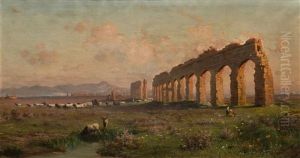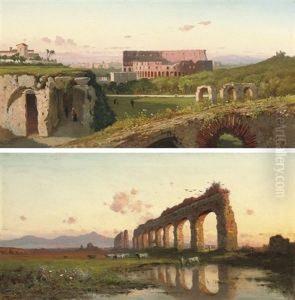Henryk Cieszkowski Paintings
Henryk Cieszkowski was a Polish philosopher, economist, and social and political activist whose contributions spanned across various aspects of 19th-century thought. Born on September 4, 1814, in Nowa Sucha, in what was then the Duchy of Warsaw, Cieszkowski came from a noble family that provided him with the means to pursue his education extensively. He completed his studies in Germany, receiving a doctorate in philosophy from the University of Heidelberg in 1838. His dissertation, 'Prolegomena zur Historiosophie' (Prolegomena to a Historiosophy), would lay the groundwork for his future works, introducing his ideas on the philosophy of history and action.
Cieszkowski's philosophical views were deeply influenced by German idealism, particularly the works of Hegel, but he sought to extend these ideas into a more practical realm, arguing for the realization of philosophical principles through action. Unlike many of his contemporaries, he believed in the possibility of progress and the realization of human potential through historical development. This optimism was reflected in his vision of a future society governed by ethical principles and led by a spiritually and morally advanced elite.
Apart from his philosophical endeavors, Cieszkowski played a significant role in the economic and political life of Poland. He was a pioneer in the cooperative movement, advocating for the establishment of agricultural cooperatives as a means to improve the living conditions of the peasantry and promote economic development. His social and economic ideas were ahead of their time, prefiguring many of the cooperative and mutual aid societies that would emerge later in Europe.
Cieszkowski was also involved in political activism, participating in the Greater Poland Uprising of 1848. He was a member of the Prussian National Assembly and later served in the Galician Sejm, where he was a strong advocate for Polish interests and autonomy within the Austrian Empire. Throughout his life, he remained committed to the cause of Polish national revival and the improvement of society through reform.
Henryk Cieszkowski died on March 12, 1894, in Kraków, leaving behind a legacy as a thinker who bridged the gap between philosophy and practical action. His works and ideas continued to influence Polish intellectual thought and the cooperative movement well into the 20th century.








